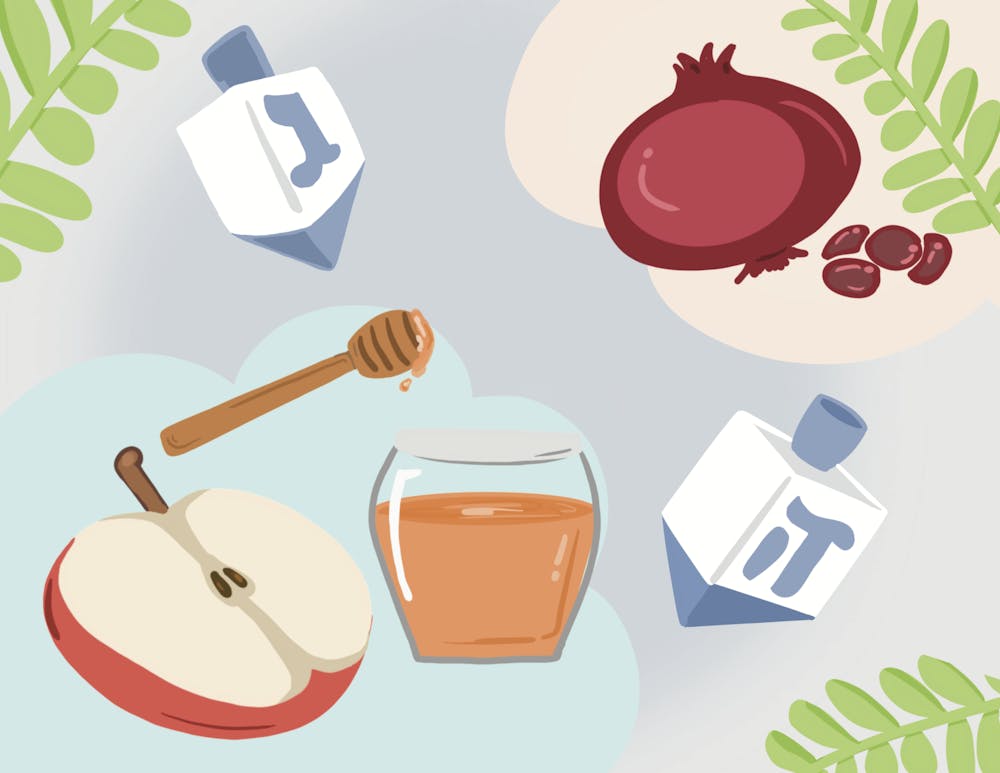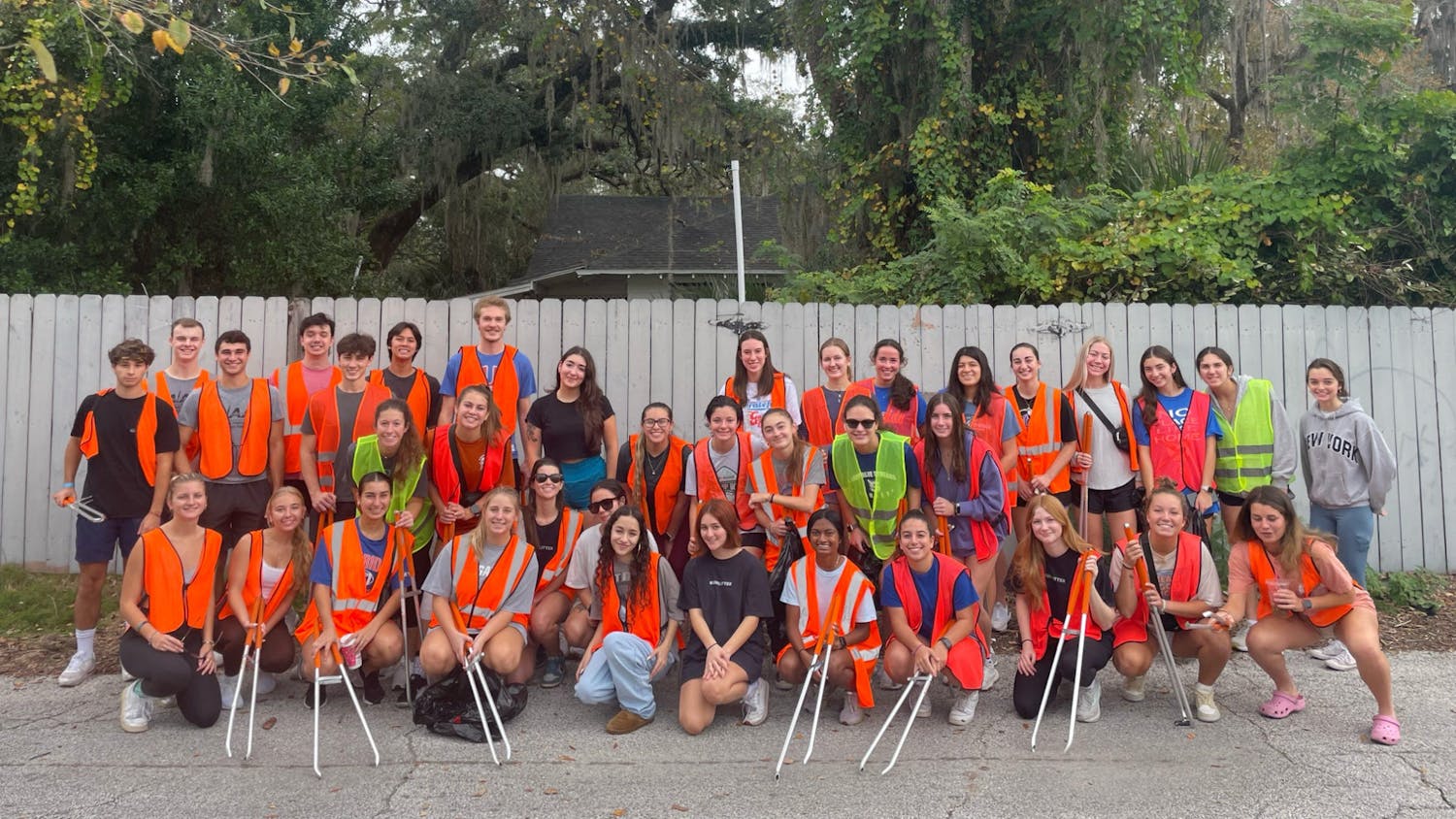Picture this: crisp apples bathed in sweet honey, a ram’s horn blown like a trumpet and the head of a fish served on a dinner plate. These objects all act as cultural symbols of the upcoming Jewish High Holidays.
Rosh Hashanah, which commemorates the creation of the world, marks the beginning of the New Year and the Ten Days of Repentance. This 10-day period is concluded with Yom Kippur, the holiest day of the Jewish year.
Jewish Gators have many opportunities to experience the High Holidays this year with services and home-cooked meals at the Lubavitch Chabad Jewish Student and Community Center and UF Hillel, which are both open to UF and Santa Fe College students.
Rabbi Berl Goldman, a 51-year-old co-director of Chabad, brought the value of serving God and the Jewish community to life 24 years ago through the creation of Chabad UF. Alongside his wife, Chanie Goldman, the pair co-founded Chabad UF to serve, enhance and grow the Jewish community.
Rabbi Jonah Zinn shares a similar mission of providing and enriching the Jewish experience at UF.
UF Hillel is a pluralistic Jewish student center that works to provide students with a meaningful Jewish experience and community. Zinn, the 41-year-old executive director of Hillel at UF, has held the role for over five years.
This year, the New Year festivities will be welcomed on the evening of Sept. 15. Jewish students exchange champagne and fireworks typically associated with a new beginning for prayer books and pomegranate seeds.
“The Jewish calendar begins around this time of year with a series of holidays that date back from the Bible and call us to engage in reflection about the year,” Zinn said. “We should both reflect on the year that has been [and] consider the type of people that we want to be in the year ahead.”
Rosh Hashanah represents the multifacetedness of new beginnings. Many traditions, like eating new or sweet foods, set the precedent for the year to come. It is tradition to serve guests with exotic fruits, like jackfruits and cucamelons, while others go the more customary route of a bowl of 613 pomegranate seeds paralleling the 613 commandments in the Torah.
“Rosh Hashanah is a time to connect to our creator and request blessings and find peace and strength for the coming year,” Goldman said. “It’s a time when we physically eat sweet foods because [this parallels] what is happening in Judaism and what we at Chabad UF believe is happening during that time– the gift of God promising us a blessed new year. Everything we do has a physical-spiritual parallel.”
Spirituality, a common practice and value in Judaism, is essential to welcoming in the Jewish New Year. The experience includes introspecting on one’s character and understanding how that manifests into the rest of one’s lives and relationships.
“Rosh Hashanah is a time of introspection [and] of recognizing that we are not living in a jungle. There’s a creator to the world. The universe has order and a focus and purpose,” Goldman said.
The act of introspection is necessary in setting intentions for the year to come. The Ten Days of Repentance give Jewish people the initiative to look deeply into their thoughts and characters.
“One could also translate the [Ten Days of Repentance] as the Ten Days of Return because we return to that most authentic and best version of ourselves,” Zinn said. “The High Holidays give us that opportunity to pause, to look back and forward and to really determine how we can be the best version of ourselves in the year ahead.”
Yom Kippur, the final of the 10 days, is the day Jewish people spiritually cleanse themselves, which begins Sept. 24 at sundown.
Jewish people put aside physical enjoyment and disconnect from the material world by avoiding showers and leather. They dress head to toe in white clothing and garments to symbolize angels and the purity of our characters after pleading for forgiveness. In contrast to the feasts of Rosh Hashanah, Jewish people refrain from food and water for 25 hours on Yom Kippur.
For many, Rosh Hashanah is celebrated in the company of family and friends. The average Jewish person spends half of their day praying and reflecting in a synagogue and the other feasting on a cornucopia of food around a table of familiar faces. Chabad and Hillel offer several opportunities for Jews to do both.
“Sometimes in our busy lives, especially as students, we go through the motions of our social circles,” Goldman said. “And the High Holidays is a perfect time, through the services, through programs, through the prayers, where people can take a breather and tap into their personal self.”
Chabad and Hillel provide students with the unique opportunity to experience the holidays at a home away from home. Students will walk home with a satiated appetite and a heart filled with purpose.
“Being together in a large setting with hundreds of students for a restaurant meal is different from most students' experience at home,” Zinn said. “That’s one of the joys of being in college and having this communal experience.”
The holidays are the busiest time of the year for both organizations that work tirelessly to create a home away from home for their students. Two of those students, 22-year-old Joseph Bensabat and 21-year-old Aden Barash, have found community and a new meaning in their Jewish identities through the High Holidays experience.
Joseph Bensabat, a UF alumnus and president of the Chabad executive board for the last two years, works to help new students feel welcome and find a sense of community.
“It really makes you feel like you’re at home when you go to the services and all the holiday events in Gainesville,” Bensabat said. “The spiritual experience [they offer] helps you connect with your Jewish background and identity. It is important for college students to have a place to do that.”
Aden Barash, a UF psychology junior, is the student director of Reformed Jewish Life at Hillel. He works primarily on the religious life committee where he plans holidays and Shabbat meals. Born and raised out of state, Barash found the holidays to be especially meaningful being away from home.
“It’s really special to have a place like Hillel, where people come together whether they’re from in-state or out-of-state,” Barash said. “You have so many people coming and celebrating these holidays together as a community.”
On top of the delicious meals, the two organizations provide a range of services catered to students’ different needs. Hillel offers both reform and conservative services, two forms of Jewish expression.
“It’s really powerful seeing students from different backgrounds across campus joined together to welcome the new year,” Zinn said. “The idea that even though as a community we may have different kinds of ideas and traditions and we can join together as a community is really powerful to me.”
Chabad and Hillel empower students to embrace and practice their traditions from home. They also push students to explore new experiences.
“People bring their own tunes they grew up doing to different prayers or offer their own reflections on certain prayers and blessings,” Barash said.
Chabad has even incorporated a student’s Sephardi tradition of singing a special prayer in front of the ark into their routine. It has continued the tradition every year since.
“We love seeing [traditions of students], and that is part of the Chabad UF philosophy and approach. Every single Jewish person is not only welcome, but included,” Goldman said. “If they have a specific tradition or something that would help them celebrate their Judaism, it should be part of their experience.”
Chabad and Hillel have information about High Holiday services, meals and programming on their websites, all free of cost. Students are encouraged to RSVP beforehand and come with an open mind and heart.
Contact Molly Seghi at mseghi@alligator.org. Follow her on Twitter @molly_seghi.
Molly Seghi is a first-year journalism major at UF and a Fall 2023 Avenue Reporter. When not writing or journaling, she can be found at a live music event or working on her podcast “An Aural Account.”






